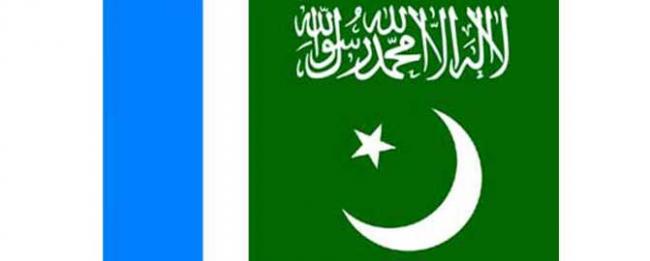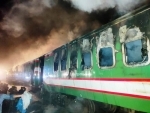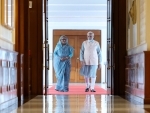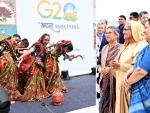Column

Country’s enemy Jamaat must be resisted
Two parts of Pakistan spoke different languages. Punjabi, Sindhi and Urdu were primarily the languages in West Pakistan, but Bengali was the only language in East Pakistan. An ordinance was declared in 1948 making Urdu official language of the whole of Pakistan. This created huge resentment in East Pakistan. People of East Pakistan expressed their anger against this attempt to impose Urdu on them. The anti-Urdu movement soon snowballed in to a major confrontation with the West Pakistani rulers. On February 21, 1952 young men and women came out on the roads and sacrificed their life to uphold Bengali language, their mother tongue. Later on February 21 has come to be observed as International Mother Language Day. This language movement
was the precursor to Bangladesh liberation war and India-Pakistan war (1971).
In the then Pakistan National Assembly there were 313 seats out of which, on the basis of population, 169 seats were meant for East Pakistan. In the parliamentary elections held in 1970, the Awami League led by Sheikh Mujibur Rahman secured 167 seats. By winning the largest number of seats, Sheikh Mujibur Rahman of Awami League became chief contender for the post of Prime Minister of Pakistan as per Pakistan’s Constitution. But this was not acceptable to the then Pakistan Peoples Party leader ZA Bhutto who placed a proposal for two Prime Ministers for two parts of Pakistan. But this proposal was rejected outright by the Awami League. All talks and negotiations to resolve the issue failed giving rise to anarchy and as a result Pakistan came under Martial Law.
On March 7, 1971 Sheikh Mujibur Rahman gave a historic speech at Racecourse ground (now Sohrawardy Udyan) saying that this time the struggle of the people was for liberation from Pakistani clutches. This speech was historic as what Sheikh Mujibur Rahman said at that time inspired millions of people to plunge headlong in the movement for liberation. In order to resist this movement Pakistan deployed its troops under a military operation codenamed ‘Op Searchlight’. Bengali soldiers in Pakistan army were sidelined. Many among them were killed. Arms and ammunition given to them were taken back. The marauding Pakistani forces launched Op Searchlight on the night of March 25 when worst form of brutalities were perpetrated on the freedom fighters and civilian people alike. Bangabandhu Sheikh Mujibur Rahman realized that talks or negotiations with the Pakistani authorities would not yield any positive result and he gave a call for independence. In a written statement issued on March 26 he said “From today, Bangladesh is an independent and sovereign country. ... Bengali army personnel, Police and EPR are fighting against the occupying Pakistani forces valiantly. May the Allah give us victory in our fight for liberation. Joy Bangla”.
This speech reached Chittagong through telegram. Major Ziaur Rahman was then Commanding Officer of East Bengal Regiment located there. From Kalurghat radio station he read out Sheikh Mujibur Rahman’s declaration of independence. This announcement was intercepted by a Japanese ship and subsequently Radio Australia
and BBC broadcast this message. Later on, government of the Republic of Bangladesh, (a government in exile, also known as Mujibnagar Government) was set up at Meherpur near Bangladesh – India border. A new army was set up for the new nation. Bengali personnel in Pakistani army, police and other security forces joined the newly raised Bangladesh army. This Bangladesh army personnel launched guerilla war against the
Pakistani occupation forces. The neighbouring India extended economic, military and diplomatic assistance to make the liberation war a success.
East Pakistan’s liberation war met with stiff resistance from Jamaat-e-Islami (JEI). Razakar, Al Badar and Al Shams – three wings formed as militia by the JEI – had perpetrated inhuman brutalities on the freedom fighters. Peace Committee was formed by JEI leaders to render assistance to the marauding Pakistani forces. During the nine month long bloody liberation war in 1971, Pakistani occupation forces aided by JEI activists committed heinous war crimes that left over three million people killed and a quarter million women violated, let alone the planned elimination of the best Bengali brains of the soil on December 14, 1971. Names of some JEI leaders who were directly involved in killing freedom fighters and raping Bengali women and girls are given below:
(1) Ghulam Azam
(2) Maulana Siddiq Ahmed
(3) Abdul Matin
(4) Prof Ghulam Sarwar
(5) Akkas Ali Khan
(6) Maulana Matiur Rahman Nizami
(7) Mohammad Kamruzzaman
(8) Abdul Aleem , Jaipurhat
(9) Mohammad Ainuddin, Rajshahi
(10) Maulana Delwar Hossen Sayeedi
(11) Abdul Kader Molla
(12) Maulana Abdus Sobhan, Pabna
(13) SAM Sulaiman, Narayanganj
(14) Maulana AKM Yusuf, Bagerhat
(15) Ali Ahsan Mohammad Mujahid
(16) ABM Khaleq Majumdar, Comilla
(17) Riazuddin, Phulberia
(18) Maulana Abdul Bari, Jamalpur
(19) Anwar Hossen Antu, Sherpur
(20) Maulana Fazlul Karim, Netrokona
(21) Prof Mahiuddin, Noakhali
(22) Dr Matiur Rahman, Rajshahi
(23) Dr Wasim, Rajshahi
(24) Dr Sharif Ahmed, Rajshahi
(25) Qayum Munsi, Nilphamari
(26) Md Abdul Qayum, Nilphamari
(27) Matin Hasmi, Nilphamari
(28) Md Mohammadullah, Pabna
(29) Azizur Rahman, Barishal
(30) AM Ruhul Quddus, Khulna
(31) Enamul Huq Manzu, Chittagong
(32) Sardar Abdus Salam, Dhaka
(33) Abdul Bari, Jamalpur
(34) Mohammad Ali, Sunamganj
(35) Md Abdul Jabbar, Feni
(36) Nurul Amin, Mymensingh
(37) Dr Abdul Bari, R University
(38) Mashiur Rahman, Rangpur
(39) Dr Mustafizur Rahman, D University
(40) Dr Hasan Jahan, D University
(41) Chowdhury Moinuddin, Chittagong
(42) ATM Matin, Chandpur
(43) Dr Mohsin, Lalmunirhat
(44) ALM Yusuf, Kulaura
(45) Salauddin Quader Chowdhury, Chittagong
(46) Saad Ahmaed, Kusthia
(47) Enamul Kasem, Kurigram
(48) Md Mujibur Rahman, Comilla
(49) Nurul Anwar, CHittagong
(50) Yusuf Ali Chowdhury, Chittagong
Those who had committed heinous war crimes 42 years back to foil the emergence of Bangladesh are very active even now without any trace of remorse on their face for all their misdeeds. They are indulging in muscle flexing to scuttle the ongoing war crimes trial initiated by the Awami League led government in accordance with
the party’s pre-election pledges. The trial has been lauded by various international agencies for its transparency and neutrality. The Tribunal has already declared verdict in two or three cases. Rest of the verdicts is likely to come out soon. People of the country are eagerly looking forward to see justice meted out to the war criminals.



